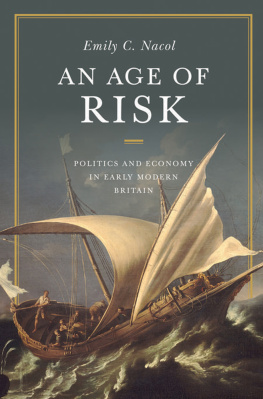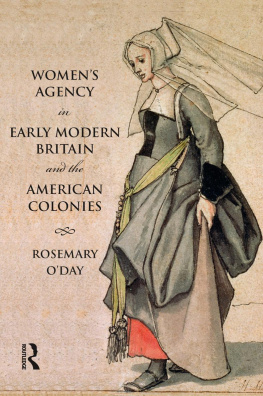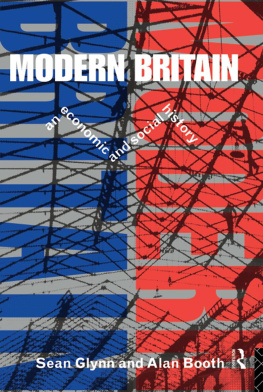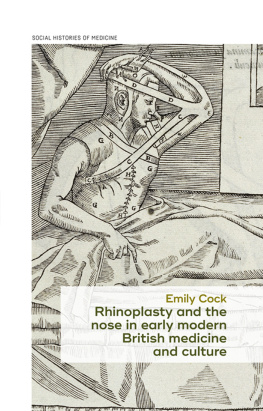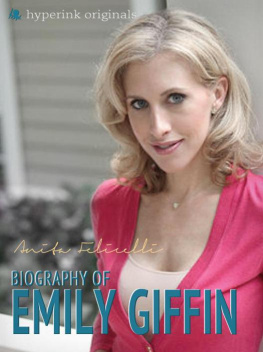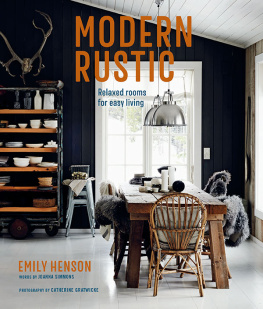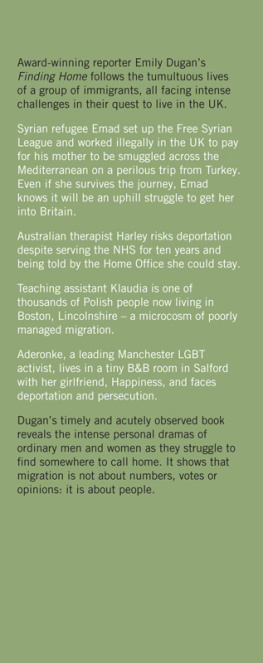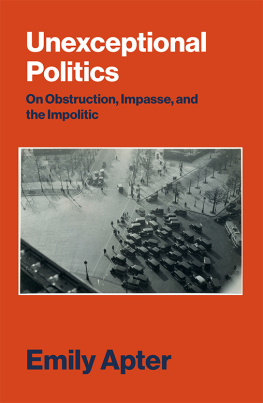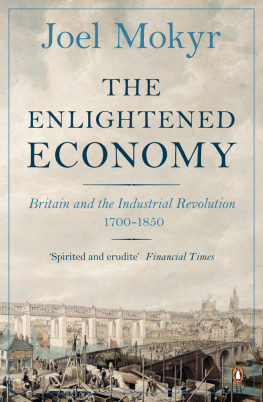Nacol Emily C. - An Age of Risk: Politics and Economy in Early Modern Britain
Here you can read online Nacol Emily C. - An Age of Risk: Politics and Economy in Early Modern Britain full text of the book (entire story) in english for free. Download pdf and epub, get meaning, cover and reviews about this ebook. year: 2016, publisher: Princeton University Press, genre: Politics. Description of the work, (preface) as well as reviews are available. Best literature library LitArk.com created for fans of good reading and offers a wide selection of genres:
Romance novel
Science fiction
Adventure
Detective
Science
History
Home and family
Prose
Art
Politics
Computer
Non-fiction
Religion
Business
Children
Humor
Choose a favorite category and find really read worthwhile books. Enjoy immersion in the world of imagination, feel the emotions of the characters or learn something new for yourself, make an fascinating discovery.
- Book:An Age of Risk: Politics and Economy in Early Modern Britain
- Author:
- Publisher:Princeton University Press
- Genre:
- Year:2016
- Rating:5 / 5
- Favourites:Add to favourites
- Your mark:
- 100
- 1
- 2
- 3
- 4
- 5
An Age of Risk: Politics and Economy in Early Modern Britain: summary, description and annotation
We offer to read an annotation, description, summary or preface (depends on what the author of the book "An Age of Risk: Politics and Economy in Early Modern Britain" wrote himself). If you haven't found the necessary information about the book — write in the comments, we will try to find it.
An Age of Risk: Politics and Economy in Early Modern Britain — read online for free the complete book (whole text) full work
Below is the text of the book, divided by pages. System saving the place of the last page read, allows you to conveniently read the book "An Age of Risk: Politics and Economy in Early Modern Britain" online for free, without having to search again every time where you left off. Put a bookmark, and you can go to the page where you finished reading at any time.
Font size:
Interval:
Bookmark:

AN AGE OF RISK
AN AGE OF RISK
POLITICS AND ECONOMY IN EARLY MODERN BRITAIN
EMILY C. NACOL
Princeton University Press
Princeton & Oxford
Copyright 2016 by Princeton University Press
Published by Princeton University Press,
41 William Street, Princeton, New Jersey 08540
In the United Kingdom: Princeton University Press,
6 Oxford Street, Woodstock, Oxfordshire OX20 1TR
press.princeton.edu
All Rights Reserved
Quotes from Lockes Second Treatise of Government
(pages 45, 46, 51, 52, 53, 54, 55, 56, 57, 58, 59, 60, 62, 63)
Reprinted with the permission of Cambridge University Press
Quotes from Locke on Money (pages 66, 67)
By permission of Oxford University Press
Quotes from Humes Treatise of Human Nature
(pages 71, 72, 73, 74, 75, 76, 77, 78, 79, 81, 82, 83, 84)
By permission of Oxford University Press
ISBN 978-0-691-16510-3
Library of Congress Control Number 2016942224
British Library Cataloging-in-Publication Data is available
This book has been composed in ITC New Baskerville Std
Printed on acid-free paper
Printed in the United States of America
1 3 5 7 9 10 8 6 4 2
For my parents
CONTENTS
EXPERIENCE CONCLUDETH NOTHING UNIVERSALLY
Hobbes and the Groundwork for a Political Theory of Risk 9
THE RISKS OF POLITICAL AUTHORITY
Trust, Knowledge, and Political Agency in Lockes Politics and Economy 41
HUMES FINE BALANCE
On Probability, Fear, and the Risks of Trade 69
ADVENTUROUS SPIRITS AND CLAMORING SOPHISTS
Smith on the Problem of Risk in Political Economy 98
ACKNOWLEDGMENTS
A lthough writing a book can often feel like a very solitary enterprise, acknowledgment pages tell the true storythat authors are supported by communities. I am very fortunate and happy to thank my community here, by naming the institutions and people who have helped me with An Age of Risk.
I would be remiss not to start by thanking the people who introduced me to political theory during my undergraduate days at Wellesley Collegethe late Ed Stettner and Roxanne Euben. Through their work and pedagogy, they taught me to think about politics in a different way. Anna Abulafia and John Marenbon, of Cambridge, deepened my love of premodern political thought and helped me venture into the world of epistemology and theories of knowledge.
This book began as a dissertation at the University of Chicago. Danielle Allen, Jacob Levy, and Patchen Markell helped me find and nurture this project and build a new intellectual life for myself. Through Danielles own work and her engagement with my writing, she has shown me that the gulf between normative and historical approaches to political theory is not so wide after all. Since the beginning of this project, Patchen has asked me incisive questions about politics that have guided my thinking, questions that I am still struggling to answer for myself. Jacob encouraged me to explore the world of political economy in the long eighteenth century, a suggestion that set me on a path of inquiry I never could have imagined for myself. Hes always a few steps ahead of me! That these three people remain committed to my scholarly development, as their lives grow even busier, is a testament to their good faith and good will as mentors. Every time I sit to write something, I imagine they are my readers. The intellectual community for political theorists at the University of Chicago is singular, and I would like to thank faculty and peers there who improved this project with their constructive suggestions: Andrew Dilts, Leigh Jenco, Jennifer London, Benjamin Lynerd, Mara Marin, Victor Muniz-Fraticelli, Michelle Murray, Patricia Nordeen, Neil Roberts, Nathan Tarcov, Deva Woodly, and the lively Chicago political theory workshop participants. I owe particular gratitude to Michelle Murray, who talked with me through many different versions of this project, and Neil Roberts, who read many different drafts of its chapters. Both of them have improved every aspect of my work with their characteristic intelligence, respect, and enthusiasm.
At Brown Universitys Political Theory Project, I found a new community of political theorists and philosophers who read my work and encouraged me to expand both my scholarly range and the depth of my inquiry. John Tomasi, Corey Brettschneider, David Estlund, Sharon Krause, and Charles Larmore were wonderful faculty mentors for a lucky group of postdoctoral fellows. Sharon has read and commented on different aspects of this project and has been a steadfast mentor and scholarly exemplar. I am grateful to my friends and peers at Brown who read and engaged parts of this book: Sahar Akhtar, Libby Anker, Jason Brennan, Barbara Buckinx, Yvonne Chiu, Leigh Jenco, Helene Landemore, Dennis Rasmussen, and Drew Volmert. Libby and Leigh helped me distill this project to its most important contributions, and Dennis has patiently read and commented on more versions of this book, and my other projects, than anyone other than their author. Im extremely grateful for our intellectual camaraderie and exchange.
At Vanderbilt, I have found a diverse and erudite group of scholars immersed in social and political thought. I would especially like to thank my senior political theory colleagues Brooke Ackerly and W. James Booth for their encouragement as I finished this book, and for helping me think about how to make it as good as I possibly could. They have carefully read and commented on my work and pushed me to be as precise and bold as I could be in my scholarship. Additionally, they kindly organized a book manuscript workshop for me during a critical stage of revisions, and invited four scholars whose work has influenced mine: Deborah Baumgold, Jennifer Pitts, Dennis Rasmussen, and Andrew Sabl. The time we spent talking about this project were some of the best hours I have spent on it, and I thank all six of them for their suggestions, comments, and questions.
I spent 20122013 at Cornell Universitys Society for the Humanities, where I worked on this book and began a new project. I would like to thank Tim Murray for giving me this opportunity and creating an intellectual home for humanists who study risk. Tim, the other fellows, and the members of Cornells political theory community made this one of the richest and most interesting academic years of my life. In the spring of 2015, when this book was nearly done, I had the pleasure of participating in a Folger seminar directed by Carl Wennerlind and Julia Rudolph, on the problem of capitalism in early modernity. The conversations among our seminar participants shaped my very last revisions of this manuscript and have given me a seemingly endless supply of questions and problems to occupy me going forward.
I am extremely grateful to the friends, colleagues, and teachers who have commented on parts of this manuscript and have had conversations with me about its questions and themes. I would like to thank (again, in some cases) Brooke Ackerly, Danielle Allen, Libby Anker, Barbara Arneil, Winifred Amaturo, Deborah Baumgold, James Booth, Ross Carroll, Doug Casson, Jonathan Caverley, William Deringer, Marc Hetherington, Jennie Ikuta, Kristy King, Dan Kapust, Sharon Krause, Jacob Levy, Paul Lim, Alex Livingston, Jennifer London, Ben Lynerd, Mara Marin, Patchen Markell, Michaela Mattes, Catherine Molineux, Michelle Murray, Christopher McIntosh, Victor Muniz-Fraticelli, Eric Nelson, Patricia Nordeen, John Parrish, Jennifer Pitts, Dennis Rasmussen, Neil Roberts, Jen Rubenstein, Andy Sabl, Stacy Clifford Simplican, Anna Marie Smith, Shannon Stimson, Megan Thomas, Jeffrey Tlumak, Michelle Tolman-Clarke, Brandon Turner, and Deva Woodly. Audiences at conferences and colloquia have also provided good feedback on several of this books chapters, and have generated inspiring new avenues of research and writing: American Political Science Association, Association for Political Theory, Columbia University Political Theory Workshop, Cornell University Society for the Humanities Risk @Humanities Conference, Cornell Political Theory Workshop, George Washington University Political Science Department, Midwest Political Science Association, New England Political Science Association, University of Chicago Political Theory Workshop, University of WisconsinMadison Political Theory Workshop, Vanderbilt Social and Political Thought Workshop, and Western Political Science Association. Support from Browns Political Theory Project, Cornells Society for the Humanities, and Vanderbilts Research Scholar Grant Program gave me the resources, time, and space I needed to complete this project. Beth Estes provided invaluable research assistance, and I thank her, too.
Next pageFont size:
Interval:
Bookmark:
Similar books «An Age of Risk: Politics and Economy in Early Modern Britain»
Look at similar books to An Age of Risk: Politics and Economy in Early Modern Britain. We have selected literature similar in name and meaning in the hope of providing readers with more options to find new, interesting, not yet read works.
Discussion, reviews of the book An Age of Risk: Politics and Economy in Early Modern Britain and just readers' own opinions. Leave your comments, write what you think about the work, its meaning or the main characters. Specify what exactly you liked and what you didn't like, and why you think so.

